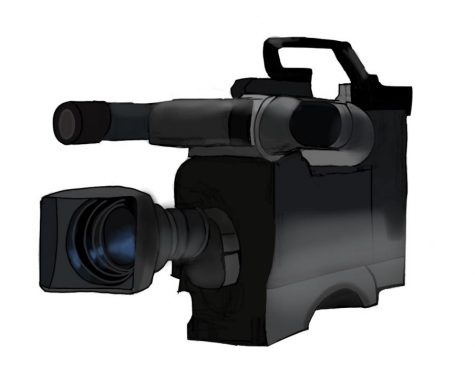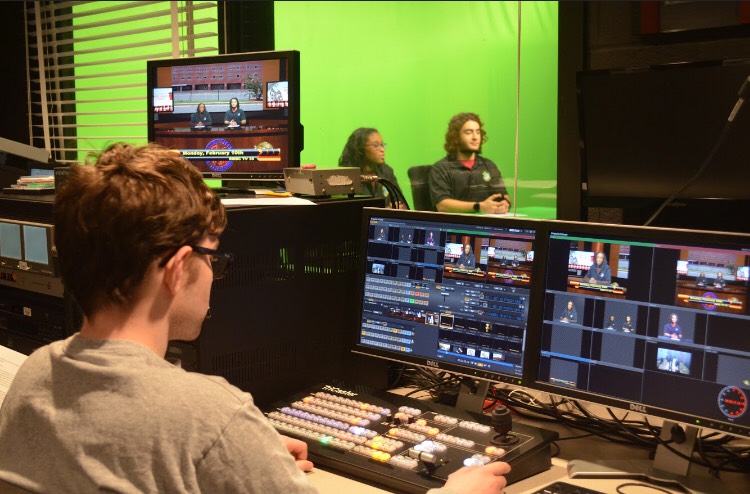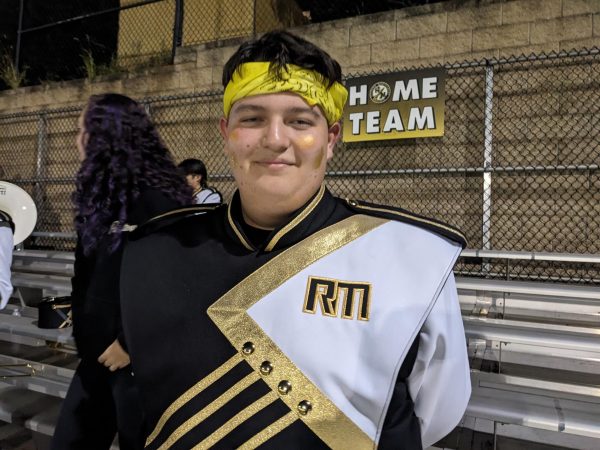RMBC cast shines the spotlight on school news
Paul Block (left) coordinates the green screen and camera angles while Caylin Rodgers (center) and Giev Batmanglich (right) prepare to read their lines.
Most RM students watch the morning announcements, given that their teachers turn it on every morning. However, what many may not know about RMBC is that it is an actual class that anyone can take. A lot of work goes into producing the daily broadcast, and so much goes on behind the scenes before everyone around the school receives their morning news everyday at 8:30 a.m.
Although Eric Rodney teaches the class, the show is very “by students, for students.” “If I wasn’t in the studio for a day, the kids would know exactly what to do and how to do it to produce a show,” Mr. Rodney said. On a normal day, the crew goes into the studio, sets up the cameras, mics and lights, turns on the classic green screen, change into coordinating outfits for on-air talent and runs through at least two or three practices before the live broadcast.
The live news does not just magically appear on Promethean boards around the school. The camera operator, the teleprompter operator, the sound operator, the technical director, the overall director and the talent are all vital parts of the process. Most of the positions are self-explanatory from their names, but they all have vastly different jobs to carry out.

Just one camera operator must take care of the all filming and has to ensure that the three cameras stay in focus for the entirety of the show. One camera focuses on the female talent, one on the male and one in the center on both. They have to effectively switch between cameras when appropriate as well.
The sound operator must be playing attention at all times. They play background music when cued, and ensure that any audio being played matches with what is seen on the screen. “If I don’t see it, I don’t want to hear it,” Mr. Rodney said.
The technical director has a board and computer dedicated to them and their position. They not only make sure things are being shown on the screen at the right times and matches up with the sound, but also must quickly play any pre-recorded videos, such as the Pledge of Allegiance that students see at the start of each show.
The talent must stick to the script, which is written everyday before the show. The teleprompter operator displays the script from a reverse mirror that only the talent can see. The talent and teleprompter operator must work with each other and coordinate so that everything runs smoothly. Everybody reads at different speeds, so the teleprompter operator also has the task of constantly readjusting the speed of the script based on the speed that the talent is reading at.
While all this is happening, the director has a headset on and is able to converse with both the technical director and camera operator to prevent any mistakes from happening while on air. All of the crew members have experience in each role, given that they rotate jobs every two weeks, but they do have favorites. “I definitely do like the talent position better than others. I just like being on camera,” said sophomore Giev Batmanglich, the current male talent.
Often, clubs, administration or the SGA will send in videos to be aired on RMBC. The crew must choose which videos to play, and this usually has to do with the length or the level of urgency of the video. While the technical director plays any pre-recorded videos, the male and female talent have some time to prepare for their next segment. However, the camera operator must stay alert because they have to signal to the talent when to start and stop talking.
The students use lingo that would be found in a real-world studio and do not leave room for errors, but they still joke around with each other off the air. “Mr. Rodney makes RMBC so fun,” Batmanglich said. Although the studio has a no-nonsense environment, off-camera, the students are comfortable with each other and work well together, to the point where their interactions are natural and lighthearted. “I definitely think this is one of the best courses at RM because it’s so student-run,” Mr. Rodney said.
To take the class, students do not need any experience at all. A student can come in knowing nothing about studio production, and by the end of two weeks, they will have mastered their job before moving onto the next. “I train new students with on-the-job training,” Mr. Rodney said. The best way to learn is through experience, and after Mr. Rodney carefully explains what to do, it is up to the students themselves to carry out their assigned roles. More experienced students often help out when needed.
Students must work together and collaborate with one another for the entire year in order to put on the daily broadcast. It does not take just one person or one position to run the show; it requires every single person in the studio to deliver to the students and staff around the school the information they need.
Your donation will support the student journalists of The Tide, Richard Montgomery High School's student newspaper. Your contribution will allow us to purchase equipment and cover our annual website hosting costs.

Delaney is fun outgoing and loves the color pink. She has been writing opinion and features articles for the tide for a while now, and wants to pursue...










